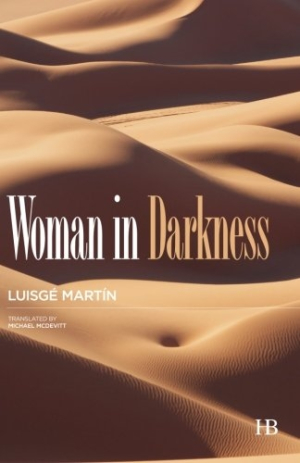Woman in Darkness
Martín explores without judgment the lives of men for whom infidelity is a given and pleasure paramount, showing both the bad and good sides of their souls.
How much can we ever really know about the people we are closest to? And when we change our lives, how much do we retain of our former identities? These themes are central to Woman in Darkness, an erotic, shadowy tale of pleasure, love, and trust, and how they so often intertwine.
Guillermo is married to the woman he loves, the mother of his infant son, the American Olivia, who stayed with him because she was too afraid to cross the ocean to go home again. And, as he confesses to his best friend, Eusebio, days before Guillermo’s accidental death, a few days a week he is consensually humiliated by Marcia in the candlelight of her apartment. Eusebio seeks out Marcia to tell her the tragic news of Guillermo’s death, but instead falls for her, and she for him, so he keeps Guillermo’s death (and his knowledge of her alter ego) a secret. But Eusebio’s new love is not the Marcia whom Guillermo knew: cruel and selfishly pleasure-seeking. She is shy and kind, and her real name is Julia. Eusebio can’t fathom how she could be the same woman, and he can’t let it go. His interest in her identity and the secrets he and those around him keep blooms from curiosity into obsession until he is utterly consumed by it. As he travels down a rabbit hole of sexual exploration and deviance, he muses, “How does madness begin? When does it set in?”
Michael McDevitt’s translation is sophisticated and seamless, and Luisgé Martín’s prose explores without judgment men for whom infidelity is a given and pleasure paramount.
Woman in Darkness is not always an easy read, and those who are sensitive to sexual content, especially involving taboo and, at times, illegal sexual interests will want to steer clear. But an exploration of those propensities is not an endorsement of them, and Woman in Darkness effectively strikes the elusive balance between the deeply erotic and the literary by exploring controversial themes with maturity. Much more than a voyeuristic look into usually hidden fetishes and fantasies, it is a study of truth in relationships and, above all, whether one can possibly trust others when he himself is untrustworthy.
Reviewed by
Sarah Stewart
Disclosure: This article is not an endorsement, but a review. The publisher of this book provided free copies of the book to have their book reviewed by a professional reviewer. No fee was paid by the publisher for this review. Foreword Reviews only recommends books that we love. Foreword Magazine, Inc. is disclosing this in accordance with the Federal Trade Commission’s 16 CFR, Part 255.

